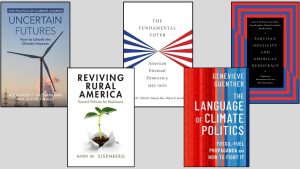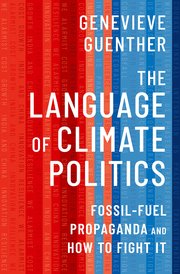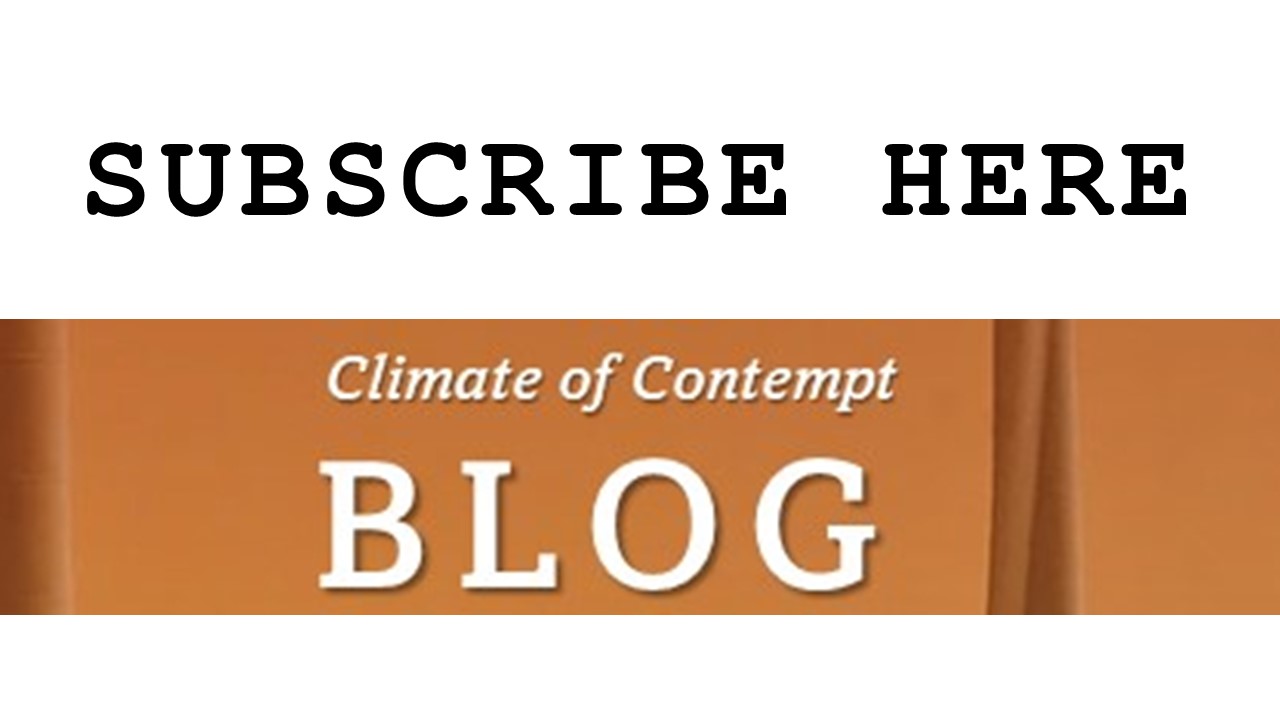
[This is the last post in a multi-part look at new books addressing what we know, and don’t know, about today’s politics. Part 1 is here; part 2 is here; and part 3 is here.]
The Final Book: Focus on Public Debate
The books we have reviewed to date have given us a closer look at what matters most to the future of the energy transition: voters. Strong climate policy is popular, and the Biden Administration oversaw a historic strengthening of national climate policy. Yet voters rejected the Administration candidate (Kamala Harris), handing control of Congress and the presidency to a party that opposes the energy transition.
The four books we reviewed so far help us understand why — why rural voters feel alienated from left-leaning urban elites (Reviving Rural America), why voters oppose renewable energy investments in their communities (Uncertain Futures), why and how partisan sorting along “the fundamentals” has polarized voters along party lines (The Fundamental Voter), and why and how partisan animus is amplifying polarization, even driving the policy views of the most active partisans (Partisan Hostility in American Democracy). Today we will discuss how partisan animus manifests in the rhetoric of public policy discussion, and feeds misunderstanding of climate politics. We will do so by reviewing this book:
Genevieve Gunther, The Language of Climate Politics: Fossil Fuel Propaganda and How to Fight It (Oxford U. Press, 2024).
Dr. Genevieve Guenther is a former Renaissance scholar turned climate activist, and this is a book aimed at climate activists. Whether consequently or coincidentally, parts of her analysis exemplify the attribution errors and disregard of empirical evidence that I lament in Climate of Contempt. So why review it here? Because many on the political left find Guenther’s prescription intuitively attractive, and it is a forceful, eloquent explication of that widely held point of view.
The Analysis
The book is organized around six claims made by opponents of stronger climate policy, and it tries to arm readers with arguments and information to refute those claims.
- Claim: Climate activists are alarmists. Rejoinder: Climate science gives us cause for alarm.
- Claim: Getting to net zero carbon emissions will cost too much. Rejoinder: To the contrary, it’s net social benefits are wildly positive, and it will cost ratepayers and consumers less than the system we have now.
- Claim: Strong climate policy will do more harm than good by inhibiting economic growth. Rejoinder: Economic models miss the importance of a healthy ecosystem to economic growth.
- Claim: Reducing greenhouse gas emissions is pointless because emissions growth in India and China will swamp those reductions. Rejoinder: China is already a climate leader.
- Claim: Technological innovations, including negative emissions technologies (NETs), will save us. Rejoinder: NETs will not work, cannot be scaled, and are political cover for fossil fuel companies’ desire to keep burning fossil fuels.
- Claim: We need to focus on “resilience.” Rejoinder: focusing on resilience and adaptation is a handwaving distraction from the seriousness of the problem, and a racist one at that because the harm of climate change falls disproportionately on black and brown people.
Each chapter explains one of these claims, tries to discredit it (and those who advance it), and offers readers the language to rebut it.
Along the way Guenther says several things with which I can agree. For example, I agree that the United States has an obligation to address the escalating impacts of climate change irrespective of what India and China do, and that fears that regulation will kill growth are overblown and premature. And Guenther’s final chapter contains this advice about how to talk to people about climate policy:
When you are having a conversation or an interaction on social media with a person or a group of people, you will need to listen very actively and compassionately to your interlocutors. Repeat back to them what you hear, kindly, and make sure you understand what they’re saying. Try to hear the feelings and the beliefs behind what they’re saying. Are they disengaged from the climate overwhelmed with financial or personal worries? Do they feel conflicting loyalties because a family member watches a lot of Fox News? Do they understand that climate change is dangerous but know nothing about the solutions? … [B]e honest with yourself about how much your conversational partner trusts and respects you. You will need to be trusted and respected for your message [to] have power.[1]
I could not agree with this more. It is a succinct, digested version of the research-supported advice I offer in chapter 6 of my book.
However, the passage surprised me a little, since I have witnessed the vitriolic way Guenther sometimes communicates online. She has accused mainstream media of disseminating “authoritarian disinformation that aids and abets genocide.” She has referred to oil companies as “sociopathic murderers” (adding an all caps “FUCK YOU” along the way). And she has called GOP politicians who restrict climate information “murderers covering up evidence of their crimes.” To be fair, those remarks are years old, and Guenther has deleted many of them. I hope she has abandoned that rhetorical approach. And to her credit, it doesn’t really feature in her book.
Advocacy vs. Scholarship
The Language of Climate Politics is intended as a kind of advocate’s handbook. As a work of climate activism, it aims to persuade the reader much like a trial lawyer would: by the selective use of the facts to motivate the reader to join (what Guenther believes is) an urgent moral crusade pitting good (climate activists) against evil (fossil fuel companies and their witting or unwitting stooges). But it also succumbs to types of motivated reasoning that are difficult for some activists to resist.
Guenther cherry picks several of the academic literatures that she invokes, and is far more forensic about critiquing studies that challenge her perspective than she is about studies that support her analysis. She recounts in detail problems with William Nordhaus’ influential climate model, devoting several pages to explaining how it understates risk. Being forensic in this way is a good thing, and she is not alone in this view of Nordhaus. But Columbia University economist Noah Kaufman offers a more helpful and nuanced take on this topic here and here; and others have pointed out the errors she makes in her discussions of the economics of climate modeling (so I won’t repeat those here).
The trouble is that Guenther much less critical about studies and information that support her narrative. In order to get a flavor of the sort of light imprecision that pops up in many places in this the book, consider this passage:
Pew Research has found that 42 percent of Americans believe, incorrectly, that a systematic transformation to renewable energy would raise the price of household heating and cooling. Only 37 percent of Americans understand that it would actually lower household energy prices. And by how much? A study from the Goldman School of Public Policy at UC Berkeley found that if America decarbonized its grid 90 percent by 2035, electricity bills would drop by 10 percent. And this may well be an under estimate, since under Obama‘s Clean Power Plan, electricity bills shrank 14 percent between 2010 and 2020.[2]
This leaves readers with a mistaken impression.
Guenther cites the Pew Research report as the source for the claims contained in the first two sentences. The Pew report does not stand for the proposition that “a systematic transformation to renewable energy” will “lower household energy prices.” The transformation to which Guenther refers throughout the book is about getting to net zero, and presumably she means for the UC Berkeley study to support the idea that that transformation will reduce consumer energy costs. But as she notes, that study only analyzed a 90% reduction in carbon emissions. And while the Berkeley study does suggest (as have several other studies) that reducing carbon emissions by 90% is affordable, it does not support the claim that discontinuing fossil fuel use or getting to net zero will lower consumer energy prices.[3]
And of course, the final statement in the passage — about energy price changes during the “existence” of the Clean Power Plan — is particularly misleading. The Clean Power Plan was repealed during the first Trump Administration, and so can’t be credited with moving power prices much one way or the other. Even if it had remained in effect, the movement of electricity prices over any decade-long period would have been driven by a complex mix of forces, not by a single policy. And the time period Guenther chose to measure price shifts ends in the middle of an historic pandemic-induced recession, which gutted demand and reduced prices.
So while I tend to be optimistic that technological advancements will make a net zero future affordable, the truth is that we just don’t know yet how costly it will be. To suggest otherwise is to mislead the reader.
There is a lot of that sort of thing in this book. As unreasonably confident as Guenther is of a future of ever-cheaper renewable energy and batteries, she is equally confident that NETs (like carbon sequestration and direct air capture) or geoengineering will fail to deliver in the end. But the last half century of the energy industry teaches us that we ought to be careful and circumspect about predicting the techno-economic future. And common sense tells us that in the race to power a net zero future, disqualifying certain technologies at the starting gate could make that future less affordable.
More troubling (to me, at least) is the way Guenther portrays advocates her disfavored technologies as dangerously disingenuous or misguided, or both. Among activists, that is a fairly common practice; but it is inexcusable among opinion leaders on whom others rely.
Like some on the progressive left, Guenther rejects versions of a net zero future that include a role for the oil companies as developers of NETs. In The Language of Climate Politics the oil industry is a sneaky enemy that “pretend[s] to care” about climate change in order to “extend their license to operate.”[4] And Guenther extends a sort of corollary suspicion to academic experts who advocate developing NETs, suggesting that they are biased by former ties to utilities or the fossil fuel industry.[5]
Sociologist and geoengineering expert Holly Jean Buck, who I have interviewed, cannot be maligned in this way. So Guenther instead charges her with using “clever implicatures” to create the false belief that carbon dioxide removal technologies are sure to work.” But I don’t understand Buck to be making that exact claim in her work. And while Guenther acknowledges that Buck has written a book called Ending Fossil Fuels, she nevertheless excoriates Buck for proposing climate solutions that leave some role for fossil fuels to stay in the mix.[6]
Too often, Guenther treats those who raise questions about tradeoffs associated with the energy transition as purveyors of “fossil fuel propaganda,” rejecting the possibility that reasonable supporters of the transition could ever raise such questions. She dismisses as “lukewarmers” abundance agenda types like Ezra Klein and the Breakthrough Institute. And she even scolds climate scientists, like NASA’s Chris Colose or Penn’s Michael Mann, for correcting the hyperbole of activists or tamping down climate alarmism.[7]
Guenther’s approach prevents her from seeing many of the people who favor the energy transition as the allies that they are. To be fair, environmental activism has always been this sort of two-sided coin. Treating a policy struggle like a moral crusade attracts followers and motivates the team. At the same time, it triggers motivated reasoning errors, especially in ideologically homogenous groups.
University of Pennsylvania political scientist Diana Mutz once observed that social movements benefit from ideological orthodoxy to “reinforce the sense that [one’s] own political views are the only right and proper way to proceed.” The truth suffers in such environments. On the other hand, the philosopher John Stuart Mill saw value in activists’ myopia: “For our own part, we have a large tolerance for one-eyed men, provided their one eye is a penetrating one: if they saw more, they probably would not see so keenly, nor so eagerly pursue one course of inquiry.”[2] Isaiah Berlin’s famous essay on the fox and hedgehog expresses similar sentiments.
So, while the world needs activists, we also need their “penetrating eyes” to be directed toward truth-seeking more than blame-seeking. They must resist the way today’s media environment helps lobbyists usher voters along a path toward ever larger attribution errors, step-by-step.
For example, conservative activists might first leverage an exaggeration by a climate activist to try to generate contempt for that activist.[9] Next, they might try to generate contempt for climate activism, or even disbelief in climate science. Similarly, progressive activists might start by leveraging contempt for an unethical act by a billionaire or corporation into to contempt for that billionaire or that corporation. That feeling can then be leveraged into contempt for billionaires and corporations generally. And so on. All of which makes people less receptive to the kind of sober analyses represented by the first four books reviewed in this series.
Conclusion
So, back to the question with which this series began: How does it end?
Perhaps the great mass of non-ideologues among Republican voters will turn against the GOP and its anti-energy transition agenda. Several of the books reviewed in this series suggest that economic self-interest could drive votes in this way, and the economic disaster that is the second Trump Administration (so far) could conceivably hasten that. If so, those changes will have to overcome the influence of the 24/7 appeals to partisan tribal resentment that fill the bubbled social media environments in which many voters live their political lives.
More pessimistic observers litter social media with quotations about transitions from democracy to authoritarianism, for obvious reasons. I discuss that idea in Climate of Contempt, citing Dietrich Bonhoeffer, Timothy Snyder, and Anne Applebaum, among others. Those thinkers emphasize that democracy requires voters who are willing and able to think critically about their own views as well as the views of others. The writer and historian Hannah Arendt made this same point in a wonderful essay called “Personal Responsibility Under Dictatorship.” Arendt, who barely escaped the Holocaust, saw a direct line between critical thinking and behaving ethically. In her words, “If the ability to tell right from wrong should turn out to have anything to do with the ability to think, then we must be able to ’demand’ its exercise from every sane person …”
One can read Genevieve Guenther’s book as an attempt to do just that, by “demanding” critical thinking about climate science, and a moral behavioral response. But is that enough? To the drafters of the U.S. Constitution building a liberal democracy in a pluralistic society required “civic virtue,” the willingness to extend a certain amount of grace to those with whom we disagree. We don’t see much of that in Guenther’s book, and we see less and less of that in our politics every day.
Our central political problem is that angry partisan extremists dominate primary elections, and thereby wield the most influence over politicians. The books reviewed in this series help us understand those people, and why they vote as they do. Most of those analyses imply (to me, at least) that simply “demanding” better moral reasoning might not be enough. We may also need to help voters find (or recover) it. That, in turn, will require patience, intellectual humility, and a mind set that is more curious and less judgmental. – David Spence
————————
[1] The Language of Climate Politics, pp. 187-88.
[2] The Language of Climate Politics, p. 68.
[3] See the appendices to the UC Berkeley study, particularly it’s review of earlier studies (some of which I cite in my book) trying to measure the cost of a decarbonizing energy system for consumers, as well as it’s assumptions about the prices of natural gas-fired power in a 90 percent decarbonized system.
[4] The Language of Climate Politics, p. 155.
[5] The Language of Climate Politics, pp. 158-159.
[6] Ibid.
[7] The Language of Climate Politics, pp. 20-21.
[8] Diana Mutz, Hearing the Other Side (2006). John Stuart Mill, Essays on Bentham and Coleridge, p. 291.
[9] Indeed, Guenther has been the object of the same sort of ad hominen attack she sometimes dishes out. For example, Breakthough Institute president Ted Nordhaus once called her a “rich lady” who “doesn’t give a fig about” poor people in developing countries.


